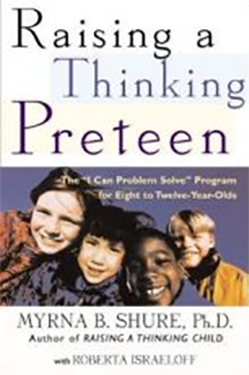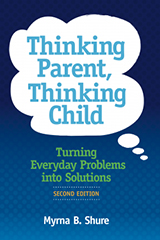Raising a Thinking Preteen
The "I Can Problem Solve" Program for Eight- to Twelve-Year-Olds
 by Myrna B. Shure, Ph.D. with Roberta Israeloff
by Myrna B. Shure, Ph.D. with Roberta Israeloff
Published by Henry Holt & Company, Inc
Hardcover/256 pages
ISBN: 0-8050-5991-1
Order the paperback:
Amazon | Barnes & Noble
Raising a Thinking Preteen introduces a unique series of exercises, games, and discussions parents can share with their eight- to twelve-year-olds that wil1 help their children recognize and express feelings they're having, help identify why others behave the way they do, and devise various reactions when faced with any challenging situation. It will also help parents listen better to their children and help them reach their own conclusions rather than provide the answers for them. This book can be used by those who are familiar with the "I Can Problem Solve Program" (ICPS) from Raising a Thinking Child, where it was applied to younger children three to seven, or you can learn its benefits here for the first time.
Throughout each chapter, developmental psychologist Myrna Shure gives clear and helpful examples of how parents can use the ICPS system to improve communication with their children by substituting a problem-solving approach for the more commonly used power approach, explaining approach, or suggesting approach. The problem-solving approach gives a child the chance to take an active part in the discussion and think for himself or herself. This is the key to raising a child who can come up with several different options in any situation, think about all of them, and then choose the best one for the situation. According to much research, this skill is the one that helps children face challenges confidently and have more success and less stress in nearly every aspect of life-as an adolescent and an adult. It also makes a parent's life much easier, as it helps children better wait for what they want, cope with the frustration of not getting what they want, get along better with peers, control their impulses and aggressions, and resist peer pressure.
Children who have ICPS skills become "can do" kids who tend to play a very active role in their own lives and not see themselves as passive bystanders in a world full of events that just "happen" to them. What parent could want more?


